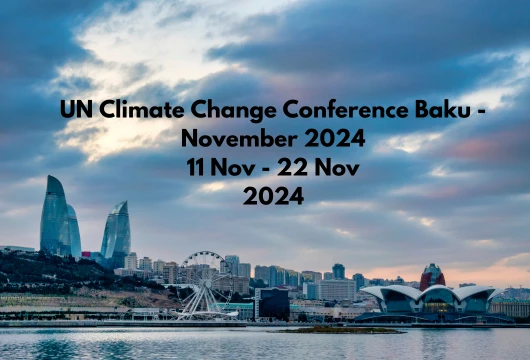As the 29th Conference of the Parties (COP29) on climate change commences from November 11-22, 2024, in Baku, Azerbaijan, India is taking a firm stand on climate accountability, sustainable finance, and equitable energy transitions. Intending to drive meaningful progress in climate action, India advocates for bridging climate finance gaps, enhancing green credit mechanisms, and advancing the “LiFE” (Lifestyle for Environment) initiative, as shared by delegates attending the conference.
India’s Strategic Climate Vision: Fostering Accountability and Sustainable Financing
India’s approach at COP29 emphasizes the necessity of accountability in global climate finance. It urges developed countries to fulfill their financial commitments to support climate adaptation and mitigation efforts in emerging economies. This accountability aspect, key to India’s advocacy, reflects the country’s goal of ensuring that climate commitments translate into concrete, reliable actions.
For India, climate accountability goes beyond holding other nations to their pledges. It involves building a framework for transparent financing that ensures funds reach the vulnerable communities and ecosystems most affected by climate change. According to a representative from India’s delegation, India aims to highlight how equitable climate action, rooted in fair financial practices, can foster more resilient societies and sustainable growth paths.
Promoting Green Credit and the Life Initiative
An additional priority for India at COP29 is to expand green credit access and integrate sustainable practices through the LiFE (Lifestyle for Environment) initiative. Green credit, a system that incentivizes individuals, businesses, and local governments to adopt eco-friendly practices, is seen as a tool to encourage sustainable lifestyles and practices at every level of society.
The LIFE initiative, a visionary approach championed by India, focuses on creating environmentally conscious lifestyles. Life proposes that small, sustainable actions, such as reducing energy consumption and promoting eco-friendly consumer behavior, collectively significantly impact the environment. India’s delegates at COP29 are expected to discuss how green credit can be a practical financial vehicle for achieving the goals outlined in the LIFE initiative, creating incentives that align with sustainable development practices.
COP29 in Baku: A Platform for Global Climate Dialogue
While this year’s conference attendance is modest compared to previous sessions, COP29 remains a critical platform for dialogue on urgent climate issues. In his opening remarks, Simon Stiell, the UN Climate Change Executive Secretary, emphasized that COP continues to be the world’s primary forum for addressing the intensifying climate crisis. Stiell highlighted that despite some progress, current commitments are insufficient, and the world risks facing an increase of five degrees Celsius in global temperature if immediate action is not taken.
“This United Nations Framework Convention on Climate Change (UNFCCC) process is the only place we have to address the rampant climate crisis and to credibly hold each other to account,” Stiell declared, underscoring the need for every participating nation to take tangible steps toward climate action. His address set a severe tone for COP29, calling for countries to adopt more aggressive, measurable climate goals.
India’s Delegation and Leadership at COP29
Leading India’s delegation at COP29 is Kirti Vardhan Singh, Minister of State for Environment, Forest, and Climate Change, accompanied by senior officials such as Secretary Leena Nandan, who serves as Deputy Leader of the Delegation, and Naresh Pal Gangwar as the Lead Negotiator. Environment Minister Bhupendra Yadav will not be attending, as India’s focus this year is to drive impactful dialogue without the traditional pavilion India has hosted in past COPs.
This departure from the usual setup reflects India’s aim to streamline its participation, focusing more on active negotiations and results-driven discussions rather than exhibit-based presence. As a developing nation facing unique energy demand and sustainable development challenges, India’s balanced approach underscores the importance of climate justice in the context of fair financing.
Addressing Climate Justice and Fair Financing
At the heart of India’s advocacy at COP29 is the principle of climate justice. Developing nations, including India, are often disproportionately affected by climate change, yet they are typically more constrained financially in adapting to its effects. India argues that developed nations, which historically contributed the most to global greenhouse gas emissions, are responsible for financing adaptation measures in regions most vulnerable to climate impacts.
India is calling for a structured approach to climate finance, aiming to ensure the fair distribution and timely allocation of funds promised by wealthier countries. By holding developed countries accountable for their financial pledges, India seeks to foster a climate finance ecosystem that is equitable, transparent, and effective in supporting the needs of lower-income, climate-vulnerable communities.
A Step Toward Green Hydrogen and Renewable Energy Solutions
As part of its broader commitment to sustainable development, India is expected to address the role of green hydrogen and renewable energy at COP29. India has made significant strides in green hydrogen technology and has developed policies to scale up renewable energy sources like solar and wind. These innovations are pivotal for India’s energy transition and are aligned with global climate targets.
Green hydrogen, derived from renewable sources, is viewed as a potential game-changer in reducing carbon emissions in industries traditionally dependent on fossil fuels. India’s investments in green hydrogen infrastructure highlight the country’s ambition to become a leading global player in the renewable energy sector.
The Way Forward: India’s Role in Shaping Global Climate Policy
With COP29 underway, India’s focus on climate accountability, fair financing, and green credit represents an essential step toward a sustainable, collaborative approach to addressing climate change. The country’s strategy seeks to hold nations to their commitments and advocates for practical, scalable solutions that integrate climate responsibility into everyday lifestyles.
India’s presence at COP29 is poised to positively impact, promoting a vision that aligns economic growth with environmental stewardship. As COP29 progresses, India’s delegation will continue to push for accountability, fair financing, and sustainable development, ensuring that climate policies reflect the values of equity and inclusivity. Through this approach, India aims to help shape a global climate agenda that emphasizes justice, resilience and shared responsibility for our planet’s future.
For more in-depth analysis and inspiring climate news, click here.

